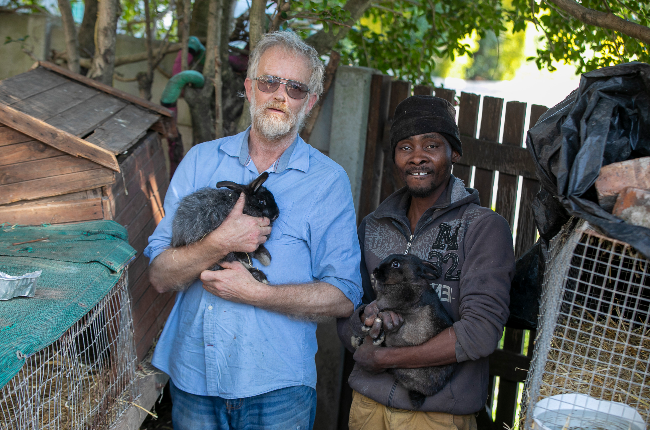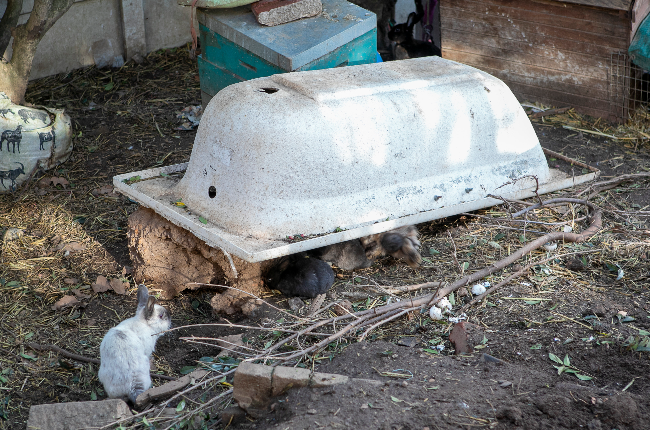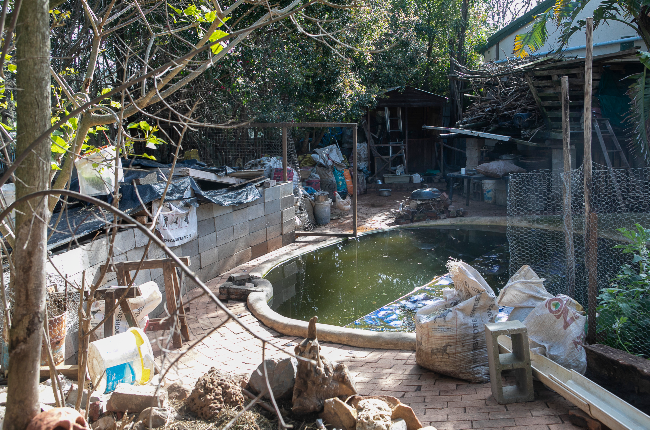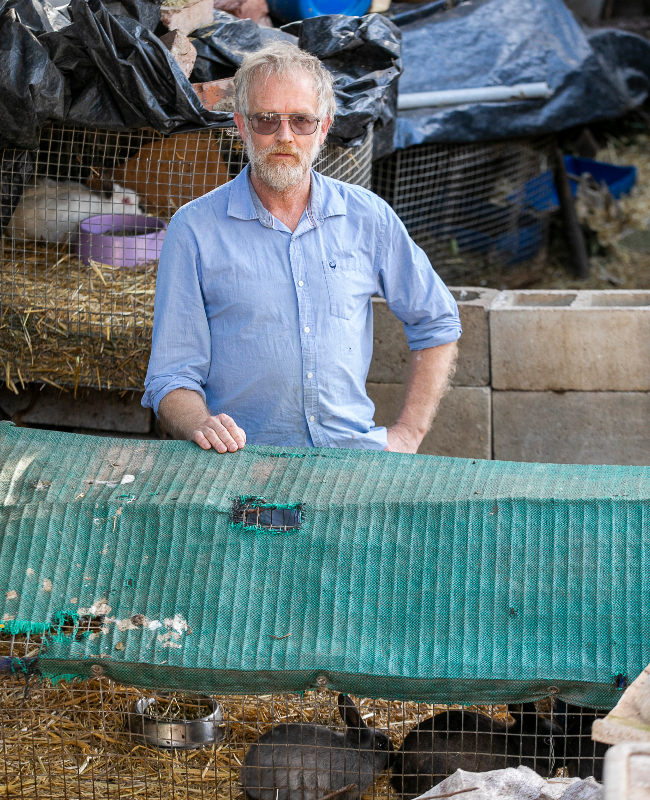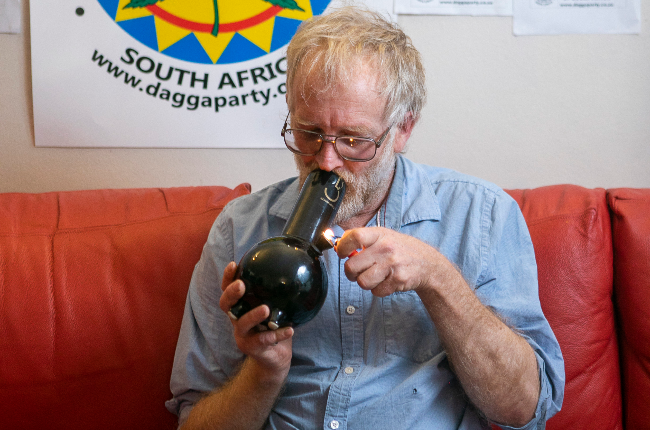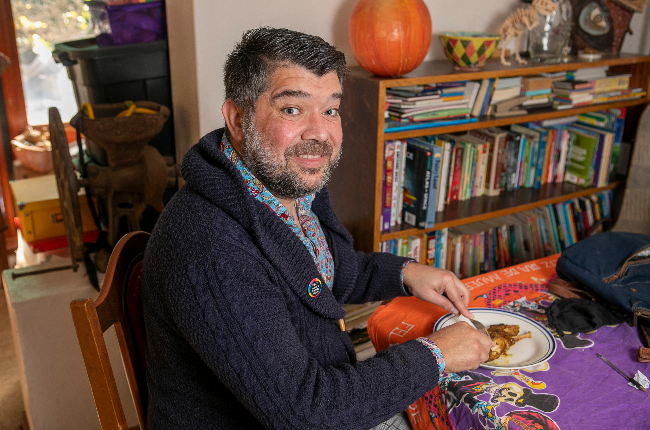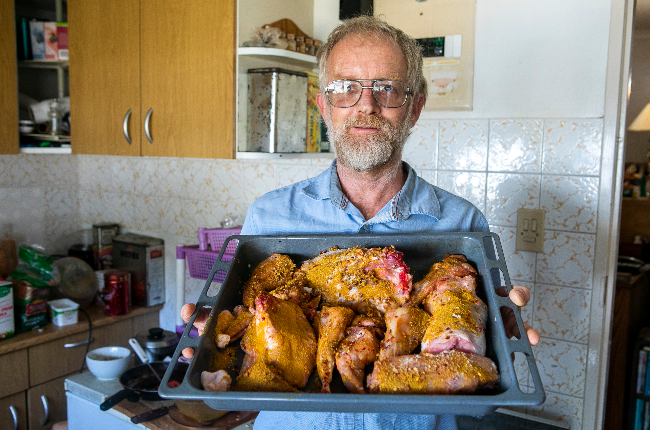
Mad as a March hare – that’s no doubt how some people might regard him. And you can’t blame them: when it comes to unconventional, this guy is seriously fur real.
From the street, his property in Cape Town’s northern suburbs looks ordinary enough – house, wall, small front yard.
But the illusion hip-hops off as soon as he opens the front door. Jeremy Acton, leader of the Dagga Party, unapologetic muncher of rabbit meat.
“Come in, come in,” he says jovially.
“I have something in the oven.”
As you walk in, you’re hit by a heavy smell of marijuana. Three hounds come to greet us: Brenda, a 12-year-old Dachshund; Timmy, a six-year-old Africanis; and eight-year-old Border collie Lady.
Jeremy (56) calls her his “sheep dog”, since he’s already accumulated 2kg of her woolly coat, which he hopes “to spin and knit something”.
He walks into the kitchen and removes a roasting pan from the oven. It contains the glistening carcasses of two rabbits, cut into portions and rubbed with curry powder, garlic flakes, sugar, salt, dry chillies and a little olive oil.
These two hail from the ranks of rabbits he breeds in his backyard – which is something the metro council of Cape Town now wants to put a stop to.
The trouble started when a neighbour complained to the council that Jeremy’s swimming pool was dirty. Not so, Jeremy countered. The pool is stocked with fish and he intends using their waste and the algae for aqua farming.
An inspector from the council came to investigate and noticed something else too: a growing colony of rabbits in Jeremy’s 230-square metre backyard.
Jeremy is now being charged in the Parow municipal court with “possession of rabbits for meat without a permit in terms of the metro council’s ordinances; the management of a compost heap of rabbit and chicken manure as well as garden refuse on the premises”.
He’s hit back with an application in the Cape Town high court in which he claims the metro council’s action is unconstitutional.
“I have the right to eat rabbits whenever and in whatever way I want,” he tells us vehemently. “It’s my constitutional right to have access to food. In the same way as I fought for dagga, I’ll keep fighting.”
Jeremy took his battle for the right to grow and use weed in his home all the way to the Constitutional Court in 2018 – and won. Now he’s on another mission: the right to his own bunny chow.
His business and food preferences have nothing to do with the city, he believes.
“Some people keep sheep to slaughter and eat on their properties. I keep enough rabbits to supply my needs. They aren’t pets, they’re food. And rabbits aren’t noisy like pigs. My chickens are quiet too. They don’t bother anyone.”
Jeremy grew up on a farm bordering the Kei River in the Eastern Cape.
“As a child I got hold of a book of my dad’s on how to breed rabbits, and I’ve been eating rabbits since,” Jeremy says as we sit at his dining room table, decked with a cloth patterned with dancing skeletons in the style of the Mexican Day of the Dead.
On a shelf next to him are two mugs bearing the dagga leaf emblem in the colours of the Dagga Party.
Jeremy gets up to check on the roast. The aromas coming from the kitchen make you feel a bit like you’re in Nando’s.
I go outside and pick up a tiny grey rabbit to cuddle from one of the pens. As I walk back to the dining room, I pass a large sack of cannabis seeds – Jeremy’s smoking stash – lying on top of a dusty autoharp, which he uses to compose folk music.
He returns from the kitchen with the roasting pan. The spiced carcasses have become golden roasts.
I cut off a piece of the tender white meat. It tastes like brown chicken meat, not at all gamey like I expected.
Suddenly in my mind’s eye I envision that little grey rabbit hopping by like the Easter bunny.
I can’t carry on eating. “Thanks, Jeremy. Can I give you the rest?”
The vegetable and cannabis garden outside beckons. He’s growing his own cultivar named AK-47, Jeremy informs us.
Rabbits, big and small, have taken refuge under upturned bathtubs elevated off the ground by blocks of wood. There must be about 40 of them flip-flopping about. Five plump hens peck around in the tilled soil, looking for grubs and bugs.
We sit on the back stoep and look out over the urban mini farm. The abattoir is in the right-hand corner of the property, Jeremy tells us.
He goes into graphic detail about how the rabbits are killed but in the interests of sensitivity it’s best we don’t describe the process. Suffice to say it’s humane and the bunnies don’t suffer.
After the rabbits are slaughtered, fellow farmer Siyabonga Tisani, originally from Cacadu in the Eastern Cape, deftly removes their pelts.
Later the entrails will become a bredie and the bones can be turned into soup.
“Urban farming can save people from going under,” Jeremy says. “Especially when there’s a pandemic going on.”
Although he has the air of a carefree stoner, his happy hippy front masks much sadness. His dad, David Acton, was shot dead in 2000 in a crime incident in the Eastern Cape. His younger brother, Roger, was also shot but survived.
His mom, Sue, moved to the little town of Stutterheim and for a while Jeremy lived on a smallholding near Montagu in the Karoo.
But that was too far away from his partner, who works in the IT industry in Cape Town, and their 15-year-old daughter (who prefer to remain anonymous). So he relocated and continued his unique way of life in the Mother City.
Jeremy holds a degree in building science from Nelson Mandela University in Port Elizabeth and previously worked as a draughtsman.
But these days he’s a full-time rabbit, poultry, vegetable and cannabis farmer here in his urban farmyard.
“Farming is in my blood,” Jeremy says in between clouds of after-lunch dagga smoke.
“This is how we’d like to live in the privacy of our home. We have easy access to food and I feel a sense of solidarity with the creatures in our yard.
“Animals enrich the human experience. How can I be denied it?”




 Publications
Publications
 Partners
Partners





